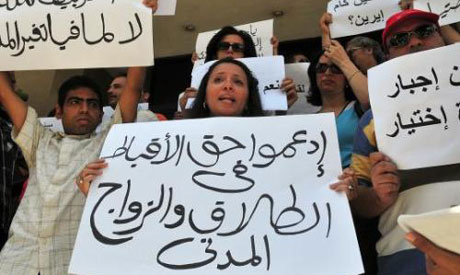Coptic Christians call for divorce law relaxation
Al Ahram Online
23/4/2012
Coptic 38 – a group founded to demand liberalisation of divorce laws by Coptic Christian Church – calls for reimplementation of 1938 bylaws that permit divorce under 9 conditions.
A Coptic Christian group called Coptic 38, established in 2011 to campaign for changes to the Church’s divorce laws, held a press conference at the Journalists’ Syndicate Monday to call for the re-implementation of 1938 bylaws that permitted Coptic Christians to obtain a divorce under nine conditions.
The recently deceased Pope Shenouda III restricted divorce to cases of adultery, conversion to Islam or to another Christian denomination in 2008.
Raafat Reid, one of group’s founders, said, “The 1938 bylaws were drafted by Priest Philosowa’as Awad in 1876 and not by secularists in 1938 as most people think. Therefore, it was a man of religion who first proposed these changes to the personal status laws after being assigned to do so by Bishop Youaaness. Despite this fact, we [Coptic 38] still cannot open any channel of communication with the Church because it refuses to accept the concept of divorce for Biblical reasons.”
Under the 1938 bylaws divorce was allowed in the following cases: attempted murder, a prison sentence of seven years, abandonment for five years, sexual aversion for three years, chronic illness, insanity for three years, sexual dysfunction, irreconcilable differences and several others.
Nader El-Serafy, the group’s official spokesperson, said, “The group is holding this press conference to demand the reactivation of the bylaws that were established by the majlis mili (lay council) in 1938 and amended in 2008.”
Peter Ramses El-Naggar, a law professor, said, “There are 1,200 cases of Coptic Christians converting to Islam in order to secure a divorce.”
Kamal Zakher, coordinator of the Secular Copts group, demanded that the Church look at the cases of Christians abandoning the Church in order to obtain a divorce and establish modern church laws.
However, Labib Haleem, vice president of the State Council, previously said the 1938 bylaws were unconstitutional.
Coptic 38 was founded a year ago by Rafik Farouk, Raafat Reid, Nader El-Serafy and an unnamed woman to call for Coptic Christians to be able to divorce and remarry.
The Coptic Church only allows Christians to annul their marriage in cases of adultery, conversion to Islam or to another Christian denomination. Any Christian granted a civil divorce is not permitted to remarry in the Coptic Church. And if they remarry in another Christian denomination, the Coptic Church does not recognise the union.
Despite pressure from much of its flock, the church under Shenouda had remained steadfast in its opposition to divorce, stressing that it was only abiding by Biblical injunctions: “What God has joined together let no man put asunder,” the New Testament states in Matthew 13:44.
The Church’s refusal to budge on the issue led many unhappily married Copts to convert to other Christian denominations or abandon Christianity altogether and embrace Islam, which allows divorce.
For years, the Coptic Church abided by the so called “1938 regulations,” which allowed Christians to file for divorce for nine reasons, one of which was “irreconcilable differences.” During this period, Christians desiring divorce had to wait a long time, but were ultimately granted the divorce. The law also allowed remarriage without express permission from the church.
After Pope Shenouda came to power, he immediately expressed his distaste for the regulations and quickly initiated procedures to change them. In 2008, he finally succeeded in limiting the grounds for divorce to adultery only.
The decision caused a public outcry among many Copts, who demanded that the church revert to the 1938 regulations. In April of last year, a group of Copts began a movement called “The Right to Live” to demand the right to divorce and remarry.
In September, the group took the controversial step of resigning from the Orthodox Church. According to Egyptian law, when a citizen formally leaves a religious community and does not join another, Islamic Law is applied, which in this case means that the Copts in question can obtain divorces and remarry if they wish.
“We made this decision to eliminate any pressure from the Coptic Church and leave the decision to the state,” says movement founder Ayman George.
Since then, about 4,000 Copts have left the church and filed lawsuits in Egypt’s Family Court for divorce.
“We now hope that the solution can be found in civil law through the family courts,” George explained. “However, Egyptian judges aren’t used to the idea of Christians of no formal denomination, and are still struggling to decide on these cases.”
“The 1938 law was originally drafted by a secular person,” explains Coptic lawyer Nabel Ghabrial. “Since it was applied, the church has repeatedly filed complaints against it because it violated the laws of the Bible, which grants divorce only in cases of adultery. The new pope will have no choice but to follow God’s law as expressed in the Bible.

